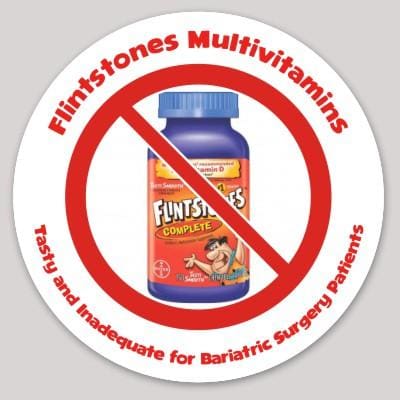Flintstones Multivitamins: Tasty and Inadequate for Bariatric Surgery Patients
Congratulations on your weight loss surgery. Even more, congratulations on your choice to take your vitamins! That is a sign that you are dedicated to your health, you are following doctor’s orders, and you intend to prevent nutrient deficiencies. Staying nourished is not always so simple, though.
The problem is that some multivitamins will leave you short on nutrients. They may omit certain vitamins and especially minerals. Furthermore, they may have far too little of certain high-risk nutrients for bariatric surgery patients.
“Complete” But Lacking Essential Nutrients
What does a “complete” multivitamin contain? It could provide anything from all the essential nutrients to just a few. There is no legal definition for “complete.” In the case of Flintstones “Complete” multivitamin chewables, “complete” apparently means that it has all 13 vitamins, but only 6 of the more than 15 essential minerals that you need.
Quantity Is Critical
For bariatric surgery patients, it is not only important to get each of the necessary vitamins and minerals, but also to have the right amounts. You need high amounts of some of the vitamins and minerals, and Flintstones chewables simply do not deliver. For example, the American Society for Metabolic and Bariatric Surgery (ASMBS) suggests at least 12 mg thiamin (vitamin B1) per day, while a chewable has 1.5 mg. You will also be short on:
- Vitamin A
- Vitamin D
- Vitamin E
- Vitamin B12
- Iron
- Calcium
“Doubling Up” Does Not Work
If one tablet is not enough, can’t you just take two? Well, not really. First, getting twice as much as certain nutrients may still leave you short. For example, 2 Flintstones chewables provide 1,200 IU of vitamin D, while recommendations for post-op gastric bypass patients are to get 3,000 IU per day. And no matter how many chewables you take, you will never get enough of essential minerals such as selenium and chromium, since the chewables have none.
Multivitamin: What Is in a Name?
We usually refer to them as “multivitamins,” but most often, we really mean, “multivitamin and mineral supplements.” Sometimes, a “multivitamin” that you buy off the shelf really is literally a bunch of vitamins with few or no minerals. Do not get confused by the name when purchasing your supplement. Read the supplement facts label to see which nutrients are in the supplement, and how much there is.
Safe Choices, Your Way
To be sure that you are getting the right supplement for bariatric surgery post-op needs, you are best off choosing a bariatric supplement. It may be a tad more expensive, but it could prevent deficiency diseases such as anemia or peripheral neuropathy. The BariatricPal Store has Multivitamin One and a wide range of other multivitamin and minerals formulated according to ASMBS guidelines.
Choosing a bariatric surgery-targeted multivitamin instead of a kids’ supplement does not mean you have to choke down capsules if you cannot stand them. You can always opt for another form, such as Powder or Soft Chew. BariatricPal Protein One has 28 essential vitamins and minerals, along with protein and fiber, in Unflavored powder or great-tasting shakes such as Chocolate, Vanilla, Cookies and Cream, Peanut Butter, Chicken Soup, and more.
For help figuring out which vitamin and mineral supplement may be right for you, you can look at the ASMBS guidelines or check out our Bariatric Vitamin Guide, which breaks down recommendations for each surgery type. Also, be sure to talk to your doctor about your individual needs before trying a supplement.










































































































